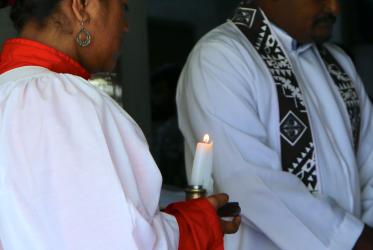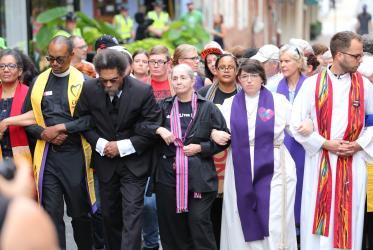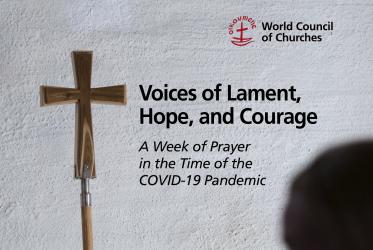Matanzas, Cuba, 15-20 May 2008
Preamble
We are in Cuba, a country that approaches the celebration of 50 years of its revolution. Cubans describe the present period as a "Kairotic" passage, a time of crisis and opportunity. The people's suffering is acute because of the U.S.-imposed blockade and the general forces of empire. By "empire" we mean the complex and dynamic international regime of power anchored by the United States, with its military power, neoliberal globalization, racist and patriarchal ideologies and policies of environmental degradation. In spite of these forces of empire and Cubans' relentless suffering, isolation and impoverization, we have been inspired by the ways Cubans persevere in struggle, embodying joy and resistance, dignity and self-esteem.
In the present moment, for example, Cubans' earlier revolutionary successes in agrarian reform have been set back by the empire's brutal blockade, other international developments, and by tensions within the country. Still, Cubans press forward with ongoing reform, inventively crafting new modes of agro-ecology.
Our meeting in Mazanzas has thus been blessed by having Cuba as a present point of reference throughout all our discussions of the crises of empire. This workshop was originally planned to take place in Beirut, Lebanon. The explosion of conflict there, and the continuing illegal occupation of Palestine by the forces of empire, remind us that this is a Kairotic moment for so many other groups worldwide.
We have gathered as a workshop, responding to the initiative of the "Oikotree" movement, an ecumenical project that has as its special goal the task of identifying and living out those spiritualities that put "justice at the heart of faith". Our workshop was convened by the World Alliance of Reformed Churches (WARC), the Council for World Mission (CWM), and the World Council of Churches (WCC).
Key Points
The wide array of justice movements in Cuba and around the world, and whether or not they draw upon religious organizations and leadership, challenge us to re-think and re-envision what spirituality is and what it must become in the present time.
Members of this workshop, as a people of spiritualities and traditions from many continents, both Christian and non-Christian, achieved a consensus on the following points. We set them out here to stimulate further reflection and action on the kind of spirituality that energizes and sustains justice movements.
On the multiplicity of spiritualities
-
We affirm that the problems of empire, amid which justice movements struggle, are not only political problems but also spiritual challenges. Empire spawns its own destructive spiritualities, such as the "religious right," and thus it seeks always to co-opt the powers of religion for imperial aims. New spiritualities are coming forth to oppose imperial spiritualities, and these should be supported.
-
All organized religions have a special challenge of resisting the tactics of division, such as forms of denominationalism and fundamentalism, which often fuel ethnic, racial, nationalist and regional strife, and so strengthen the powers of empire.
-
Justice movements require a new solidarity among religious groups and all peoples of conscience (secular and religious), and thus we affirm and honour the full multiplicity of spiritualities that enliven such movements.
-
Religious groups and all peoples of conscience should recognize a leading role for indigenous peoples, honouring especially their earth-centered spirituality, focusing on interdependencies of body, mind, land, community, and spirit, as resources for a liberating justice for all creation. We affirm the struggle of all First Nations peoples for their land and for their rights to self-determination.
-
In this time especially, the empire's worldwide "war on terror" has created a virulent form of Islamophobia that compounds other related racisms. Emergent spiritualities must stand with our Muslim sisters and brothers and work with them for a more just world for all peoples.
-
The spirituality of justice movements is strengthened by the mobile, boundary-crossing spiritualities of immigrant and displaced peoples' struggle and vision.
-
In order to sustain justice movements, spiritualities should affirm the outcries of rage and grief from those wounded by injustice, for these are positive values that can energize and focus revolutionary change.
-
Justice movements require, and also themselves create, new communities of wonder, joy and mystery. In these movements, peoples' pain and gratitude, their sadness and hopes, all break forth for new spiritual solidarities.
-
Participating in justice movements' arts (music, dance, painting, sculpture, drama, street theatre, and more) is essential to people's survival and to realizing a liberating spirituality. Leaders in the arts are thus co-partners in nurturing and strengthening the spiritualities that can resist regimes of injustice.
On Christian spiritualities
-
Justice movements challenge Christians to relinquish the hegemony of their Christian language and rituals in movement work, even when this means leaving the comfort zones of Christian belief and practice. New acts of Christian humility and confession - due to Christians' construction of empire building, colonization, racism and patriarchy - must entail a new collective and variegated spirituality forged from among all peoples, recognizing especially the initiatives of long-colonized and oppressed peoples.
-
Christian leaders and institutions, when participating in justice movements, must foster liberating spiritualities by re-interpreting their Christian stories, beliefs and practices to challenge forthrightly the forces of empire.
-
For all religious traditions, the demands made upon us by justice movements lead us toward spiritual openness to diverse readings of oral and written sacred texts and traditions, and even to a willingness to question and contest some emphases in these sources.
A closing word
-
All newly emergent spiritualities need a special vigilance about ways that neo-colonial, neo-imperial, racist and patriarchal styles of thought and action can reconstitute themselves, even in communities claiming to be in struggle against injustice.
-
We affirm that the call to participation in justice movements is so demanding that we proceed in a spirit of humility and tentativeness, confessing that the spirituality we most need is not yet completely known to us, still to be birthed by our common work, struggle and celebration of life.
Participants
-
Professor Ivone Gebara, Brazil
-
Ms Jennifer Martin, Jamaica
-
Professor Mark Lewis Taylor, USA
-
Rev. Dr Japhet Ndhlovu, Zambia/Kenya
-
Professor Jasmin Zine, Pakistan/Canada
-
Rev. Dr Peter Cruchley-Jones, UK
-
Ms Maria Koutatzi, Greece
-
Professor Pramila Aggarwal, India/Canada
-
Rev. Ronald Matthew Stevens, Canada
-
Ms Maria Aranzazu Aguado Arresse, Spain/ Switzerland
-
Rev. Robin Donalda McGauley, Canada
-
Ms Julianne Robra, Switzerland
-
Ms Chandra Budhu, Guyana/Canada
-
Rev. Raúl Suárez, Cuba
-
Rev. Daniel Izquierdo Hernández, Cuba
-
Rev. Dr Reinerio Arce-Valentín, Cuba
-
Rev. Patricia Sheerattan-Bisnauth, WARC staff
-
Rev. Dr Jooseop Keum, WCC staff
-
Ms Moraima González, Matanzas staff
-
Ms Nancy Gaviero, Cuba
-
Mr Alberto González, Interpreter
-
Ms Elisabeth González, Interpreter
-
Greta Montoya Ortega, Video/Photograph professional



